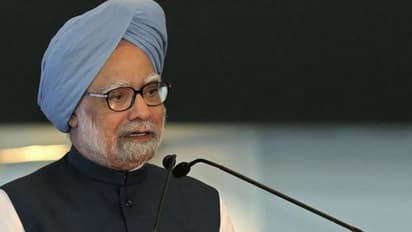Manmohan Singh passes away: From scholar to statesman, a lookback at his role in shaping modern India

Synopsis
Former Indian Prime Minister Manmohan Singh passes away at 92, leaving a legacy of economic reforms, inclusive growth, and poverty reduction that transformed India's economy and propelled it onto the global stage.
New Delhi: The passing of former Prime Minister Manmohan Singh has caused an eternal void for the nation. A calm and composed leader, the vision of the Congress leader helped the nation navigate through phases of financial crisis.
Manmohan Singh rose to prominence as the Finance Minister in the Narasimha Rao government from 1991 to 1996. He is a highly respected statesman, led India through transformative years from 2004 to 2014.
Dr. Singh's unwavering integrity, and exceptional intellectual prowess earned him widespread admiration across party lines. His leadership played a pivotal role in shaping modern India's economic trajectory, with his economic reforms as Finance Minister in the 1990s laying the groundwork for the country's rapid growth.
Manmohan Singh's tenure as Finance Minister marked a significant turning point in India's economic history. When he took office, the country was grappling with a severe economic crisis, characterized by a balance of payments issue and dwindling foreign reserves. Singh's response was swift and decisive, introducing transformative reforms that liberalized the economy, encouraged privatization, and integrated India into global markets.
These reforms had a profound impact, not only averting the crisis but also setting India on a path to becoming one of the world's fastest-growing economies. Singh's measures promoted economic growth, reduced poverty, and increased India's global competitiveness.
Singh's reforms reduced government control over key sectors, allowing for greater private sector participation and foreign investment. The government also began to privatize state-owned enterprises, increasing efficiency and competitiveness. Furthermore, India's economy was opened up to global markets, increasing trade and investment opportunities.
He is also widely recognized for implementing policies and also for his leadership in guiding the country through the 2008 global recession.
Dr. Manmohan Singh is survived by his wife, Gursharan Kaur, and their three daughters. The nation mourns the loss of this visionary leader, and details of his funeral arrangements are awaited. As India bids farewell to this remarkable statesman, his legacy will continue to inspire future generations. After his term in office ended, he continued as a member of the Rajya Sabha until his term concluded in April 2024, following which he retired. Even as his health deteriorated, Manmohan Singh was seen at Rajya Sabha on a wheel chair, which shows his commitment to his role and the nation.
Early life and politics
Manmohan Singh was born on September 26, 1932, in Gah, West Punjab, now part of Pakistan. His academic excellence led him to pursue higher education at esteemed institutions, including Panjab University, the University of Cambridge, and Nuffield College, Oxford.
Singh's early career was marked by his roles as a teacher at Punjab University, the Delhi School of Economics, and the UN Conference on Trade and Development (UNCTAD). His foray into politics began in 1971 as an Economic Advisor in the Ministry of Commerce. He rapidly rose through the ranks, holding pivotal positions such as Chief Economic Advisor and Secretary in the Ministry of Finance.
In 2004, the Indian National Congress secured a parliamentary majority, and Sonia Gandhi appointed Singh as Prime Minister. His tenure was marked by notable achievements, including the landmark Indo-US nuclear deal and unprecedented economic growth, which catapulted India onto the global stage. Other notable successes include:
- Inclusive growth and poverty reduction: Singh's administration implemented policies that promoted economic growth and reduced poverty.
- Economic boom: India experienced an average annual growth rate of 7.7% during Singh's five-year term.
- Key reforms: Singh's government introduced significant reforms, including the National Rural Employment Guarantee Act (NREGA) and the Right to Information Act.
Singh was re-elected in 2009, but his administration faced challenges, including inflation and corruption scandals. Despite these setbacks, Singh's legacy as a visionary economist and politician remains unparalleled.
Also Read: Former Prime Minister and senior Congress leader Manmohan Singh passes away at 92
Stay updated with the Breaking News Today and Latest News from across India and around the world. Get real-time updates, in-depth analysis, and comprehensive coverage of India News, World News, Indian Defence News, Kerala News, and Karnataka News. From politics to current affairs, follow every major story as it unfolds. Get real-time updates from IMD on major cities weather forecasts, including Rain alerts, Cyclone warnings, and temperature trends. Download the Asianet News Official App from the Android Play Store and iPhone App Store for accurate and timely news updates anytime, anywhere.